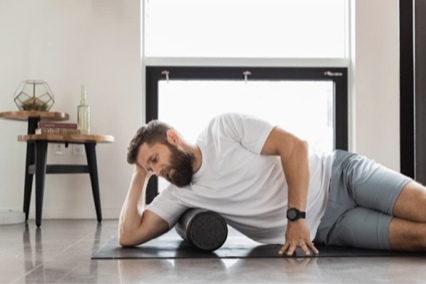Amy Sedgwick, Articles, In the Press, Internal Medicine, Resources, Yoga Medicine® News
Blue Light Blues
By Sarah Munn for Weight Watchers.
We hear about blue light all the time as this big bad thing we’re supposed to avoid. But what exactly is it? How bad is it, really? And how are we supposed to avoid it, especially when so many of us are relying on screens more than ever during the COVID-19 pandemic?
What It Is
“Blue light is part of the normal spectrum of wavelengths present in daylight,” explains Amy C. Sedgwick, MD, FACEP, E-RYT with Yoga Medicine®. “It is good for boosting attention, alertness, and mood during daytime.”
When we’re exposed to it at appropriate times, i.e. during the day, she explains, natural blue light is fine and even healthy for our overall system.
The negative effects of blue light start to creep in when we’re exposed to it after the sun’s gone down, which, before we had the technology to do otherwise, would be when our bodies would stop being exposed to light.
How It Affects Us
“As the evening time unfolds, and the daylight diminishes, we normally would be exposed to less blue light,” Sedgwick says. “However, the technology we have access to now allows for more exposure to light for longer parts of the day.”
As with natural daylight, she says, there are many wavelengths present in the artificial light produced by our electronics and in our energy-saving LED lights, with blue light being one of them.
The main effect of blue light on our bodies is sleep disruption – and sleep is crucial for good health and a good mood. Essentially, exposure to blue light in the evening is telling your brain it’s daytime and that you need to be alert and awake – usually the opposite of what you want your body to be doing as bedtime approaches.
Prolonged exposure to artificial blue light can also lead to digital eye strain, according to the Canadian Association of Optometrists. The association notes on its website that blue light scatters more in the eye than other light wavelengths, creating “visual noise” that decreases contrast and can cause eye strain.
“All light can be disruptive to our circadian rhythms, shifting the time we become ready to sleep to a later time,” Sedgwick adds.
Blue light, however, is particularly powerful at blocking the secretion of melatonin, a substance released by the brain’s pineal gland that primes the body for sleep.
“LED lights tend to produce more blue light than other sources of light,” Sedgwick says.
How to Reduce Exposure
If you have LED lights like this, you can look for coated LED bulbs, which produce a warmer, less blue type of light. Sedgwick says dim, red-coated bulbs are the best for reducing the amount of blue light emitted.
“Computer screens, phones, and TVs also emit blue light,” she adds. “If you must look at screens close to bedtime or during evening hours, glasses that are coated with a blue-light blocking film can also be helpful. I personally wear them and notice a difference.”
You can also try dimming your device’s brightness, applying blue light filters (like a screen protector) or turning on the “night” function if applicable, which will make your screen a warmer, more yellow tint rather than the blue-white light we’re so used to.
Other Ways to Improve Your Sleep
In addition to limiting your artificial blue light exposure at night, there are other things you can do to ensure good quality sleep.
Here are Sedgwick’s tips for good sleep:
- Go outside: “Be sure to get exposed to bright daylight during the daytime hours,” Sedgwick says. “It will boost your daytime attention, focus and mood and will help keep your circadian rhythm healthy. Try to go outside in the morning and expose your eyes to natural bright daylight for 10-15 minutes. ‘Daylight breaks’ throughout the day can also be helpful in getting an adequate dose of full-spectrum daylight.”
- Make a sleep routine: “Try to go to bed and wake up at the same time every day, even on weekends,” says Sedgwick.
- Keep your room cool
- Stop eating at least two hours before going to bed
- Avoid alcohol before sleep: Sedgwick explains alcohol acts as a depressant of the central nervous system and can prevent you from getting deep sleep.













